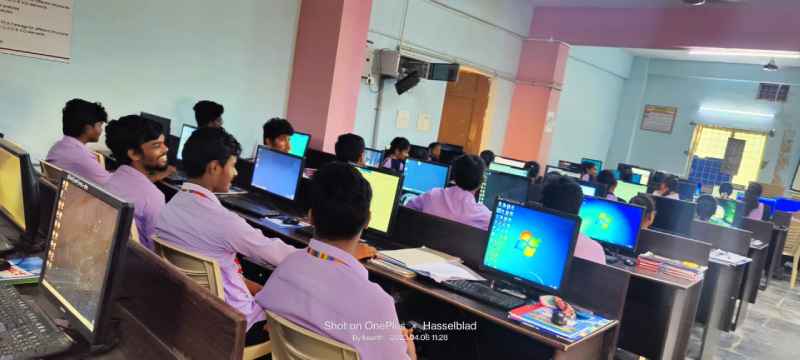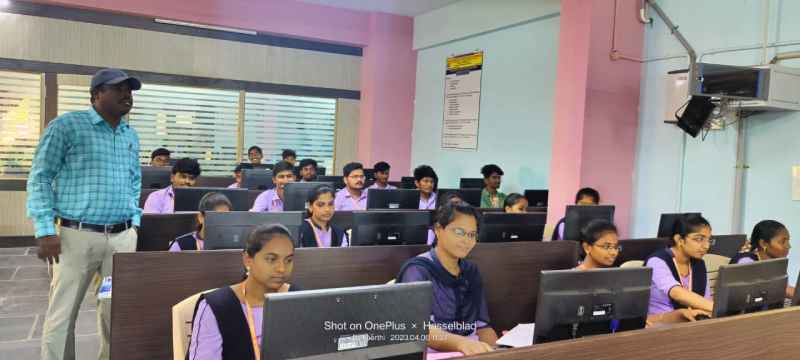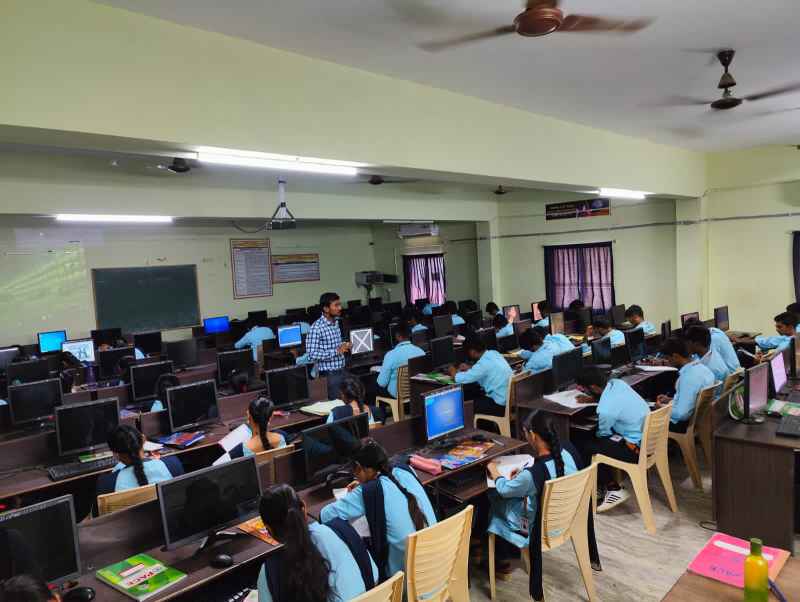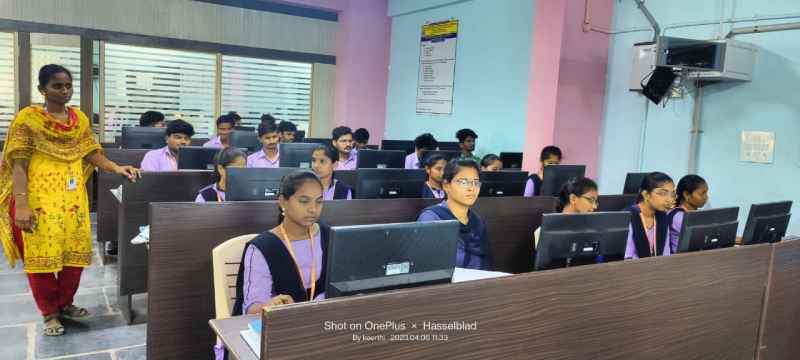The Department of Artificial Intelligence & Machine Learning was established in 2020-21.The Department offers a 4 year Undergraduate program in B.Tech. Artificial Intelligence &Machine Learning Program with the in the take of 60 students with the Academic year 2020-21. The department offers hands on training to the students to meet the requirements of industry through well-equipped and updated technological laboratories with state of the art equipment under the guidance of highly qualified, experienced and dedicated faculty.
To be globally recognized in the field of Artificial Intelligence and Machine Learning by producing competent professionals with strong ethics to meet the challenges of industry.
| M1 | To train the students on problem solving and analytical skills with modern teaching learning methodologies. |
| M2 | To transform professionals into technically competent and industry ready. |
| M3 | To promote research among the students in emerging areas to meet the need of the society. |
| PO1 | Engineering knowledge: Apply the knowledge of mathematics, science, engineering fundamentals, and an engineering specialization to the solution of complex engineering problems. |
| PO2 | Problem analysis: Identify, formulate, review research literature, and analyze complex engineering problems reaching substantiated conclusions using first principles of mathematics, natural sciences, and engineering sciences. |
| PO3 | Design/development of solutions: Design solutions for complex engineering problems and design system components or processes that meet the specified needs with appropriate consideration for the public health and safety, and the cultural, societal, and environmental considerations. |
| PO4 | Conduct investigations of complex problems: Use research-based knowledge and research methods including design of experiments, analysis and interpretation of data, and synthesis of the information to provide valid conclusions. |
| PO5 | Modern tool usage: Create, select, and apply appropriate techniques, resources, and modern engineering and IT tools including prediction and modeling to complex engineering activities with an understanding of the limitations. |
| PO6 | The engineer and society: Apply reasoning informed by the contextual knowledge to assess societal, health, safety, legal and cultural issues and the consequent responsibilities relevant to the professional engineering practice. |
| PO7 | Environment and sustainability: Understand the impact of the professional engineering solutions in societal and environmental contexts, and demonstrate the knowledge of, and need for sustainable development. |
| PO8 | Ethics: Apply ethical principles and commit to professional ethics and responsibilities and norms of the engineering practice. |
| PO9 | Individual and team work: Function effectively as an individual, and as a member or leader in diverse teams, and in multidisciplinary settings. |
| PO10 | Communication: Communicate effectively on complex engineering activities with the engineering community and with society at large, such as, being able to comprehend and write effective reports and design documentation, make effective presentations, and give and receive clear instructions. |
| PO11 | Project management and finance: Demonstrate knowledge and understanding of the engineering and management principles and apply these to one's own work, as a member and leader in a team, to manage projects and in multidisciplinary environments. |
| PO12 | Life-long learning: Recognize the need for, and have the preparation and ability to engage in independent and life-long learning in the broadest context of technological change. |
| PSO 1 | Understand, analyze and develop essential proficiency in the field of Artificial Intelligence and Machine Learning. |
| PSO 2 | Learn the basic concepts of Artificial Intelligence and Machine Learning and to apply them to various fields, like Image Processing, Speech Recognition, Product Recommendations, and Medical Diagnosis etc. |
| PEO 1 | Graduates will have the ability to adapt, contribute and create innovate technologies in the field of Artificial Intelligence and Machine Learning. |
| PEO 2 | Graduates will have the ability to explore research with continuous learning in the areas of Artificial Intelligence and Machine Learning. |
| PEO 3 | Graduates will be ethically and socially responsible to solve the problems of society in the field of Artificial Intelligence and Machine Learning. |
Innovative teaching methodologies can help faculty deliver their lectures more quickly and efficiently. In an efficient manner, the students can stay up-to-date on technological developments. Innovative teaching aids aid in the development of rational thinking and self-awareness in students by encouraging them to be proactive.
FOR MORE DETAILS CLICK HERE| S. No. | Name of the Faculty | Designation | Qualification | Date of Joining | Nature of Appointment |
| 1 | Dr. Endluri .Venkata Naga Jyothi | HOD & Associate Professor | M.Tech.,Ph.D | 10.10.2022 | Regular |
| 2 | Mr.Pamulapati.Edukondalu | Assistant Professor | M.Tech | 2.21.2022 | Regular |
| 3 | Mr.Billa.Manindhar | Assistant Professor | M.Tech | 10.10.2022 | Regular |
| 4 | Mr.Nallamothu Sai Vamsi Kumar | Assistant Professor | M.Tech | 1.1.2022 | Regular |
| 5 | Mrs.Seethalam Venkata Tejaswini | Assistant Professor | M.Tech | 5.15.2023 | Regular |
| 6 | Mrs.SK Heena Kausar | Assistant Professor | M.Tech | 6.15.2015 | Regular |
| 7 | Mrs.Chinta.Yashoodhara devi | Assistant Professor | M.Tech | 5.15.2023 | Regular |
| 8 | Mrs.Yarajerla Aruna | Assistant Professor | M.Tech | 5.15.2023 | Regular |
| 9 | Mr.Burra.KarthIk | Assistant Professor | M.Tech | 2.26.2022 | Regular |
| 10 | Mr.M.Madhava reddy | Assistant Professor | M.Tech | 6.25.2018 | Regular |
| 11 | Miss.N.Haritha patel | Assistant Professor | M.Tech | 10.3.2023 | Regular |
| 12 | Mr.Namburi.Teja | Assistant Professor | M.Tech | 10.10.2022 | Regular |
Programming refers to a technological process for telling a computer which tasks to perform in order to solve problems. You can think of programming as collaboration between humans and computers, in which humans create instructions for a computer to follow (code) in a language computers can understand.

Database Lab Platform is a unified solution that helps developers, DBAs, SREs, and QA engineers boost their work with PostgreSQL databases. They all can get their work done much faster thanks to the thin cloning of databases and the high level of automation of various tasks that the Platform offers.

The laboratory networks were established to provide accurate and timely laboratory confirmation of infections, an essential component of disease surveillance systems. The laboratory networks provide high-quality surveillance data to help guide disease eradication, elimination and control programmers.

This short course is designed for students who plan to learn about common data structures with efficient algorithms, solve LeetCode problems, and know state- of-the-art information techniques. The achievements of Algorithms Lab are listed below:

| Academic Year | I Year | II Year | III Year | IV Year |
|---|---|---|---|---|
| 2022-23 | 22KQ1A06103 MOUNIKA | 21KQ1A6104 G.V ASHA JYOTHI | 20KQ1A6116 R.UMA SAKUNTHALA | --- |
| 2021-22 | 21KQ1A6104 G.V ASHA JYOTHI | 20KQ1A6116 R.UMA SAKUNTHALA | --- | --- |
| 2020-21 | 20KQ1A6116 R.UMA SAKUNTHALA | --- | --- | --- |
© PACE INSTITUTE OF TECHNOLOGY AND SCIENCES (PACE ITS)